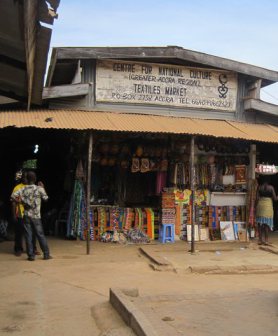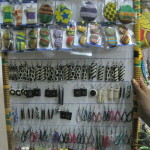A previous volunteer in Ghana told me that you have to bargain for everything in Accra. I immediately threw my hands up in defeat saying well there goes everything for me! I was intimidated by the thought of it.
In my first two days here, my Operations Manager and I took taxis. I saw her negotiate the price of our travels but it was all in Twi. I figured taxi drivers and vendors would eventually hear my foreign accent and sense my lack of bargaining skills when it came time to be on my own.
The key is to ask a friend what the average price is from point A to B or ask a few vendors their prices. Sometimes you will pay a little more or a little less. When I bargain, I immediately take a few dollars off, some bargainers half the price. You negotiate with your face, your eyebrows, cheeks and shoulders. It’s an intuitive act that requires emotional tact which, like anything, you will master overtime.
 One Saturday, after leaving my seamstress, I decided to take a stroll to the Centre for National Culture. I’ve been there before and remember the “Sista, come, ah no, come take a look, you would like it!” by a corridor full of artisans and witnessed the bargaining game. On my way there, I worried the over hundred vendors would swallow me up. Given that I was alone, I never imagined that I would walk out with a bag full of handmade jewelry, leather bag, ebony spoons and more at good prices.
One Saturday, after leaving my seamstress, I decided to take a stroll to the Centre for National Culture. I’ve been there before and remember the “Sista, come, ah no, come take a look, you would like it!” by a corridor full of artisans and witnessed the bargaining game. On my way there, I worried the over hundred vendors would swallow me up. Given that I was alone, I never imagined that I would walk out with a bag full of handmade jewelry, leather bag, ebony spoons and more at good prices.
I engaged in fun conversation with each vendor and reminded them that “I’m just looking around”. Stall #3 would sell earring at USD $10 and you would negotiate to $7 but by the time you get to the end of the corridor, the price starts at USD $5. So when you thought you had a deal, you didn’t, and even with the second price you can still negotiate. The strategy is to look around and ask around because they will all say “I want you to get something for yourself, you deserve it.”
“Doh rob de people dem!” – The West Indian 🙂
It’s easy to take advantage of someone’s bargaining power when the competition is stiff. You can walk away to another vendor or bargain and pay an amount that fills you with guilt or should be considered illegal and morally wrong. We complain of big corporations taking advantage of those who produce raw material (farmers, women who make shea butter in the villages etc.), so let’s show love, a different side to outside buyers. If you really can’t pay more, fine, but try to patronize the vendor if given the opportunity later. Think of it as a semi-charitable opportunity, perhaps they made no sales for the day.
Most importantly, don’t create tension between two vendors. There is no need to say David in Stall #28 offered you USD$5 for them to wage a price war. You can stand on your own ground as a bargainer without stepping on someone’s livelihood or hampering relationships.
Keep all of the above in mind while ensuring you also aren’t taken advantage of. Bargaining is the culture of Ghana. Don’t be intimidated, embrace it and become a little Ghanian yourself. You win some, you loose some but you will become a pro at it in no time!
Originally posted on Youth Challenge International’s website: https://ycicanada.wordpress.com/2013/07/25/shalisha-samuel-how-to-bargain-like-a-boss-in-ghana/






